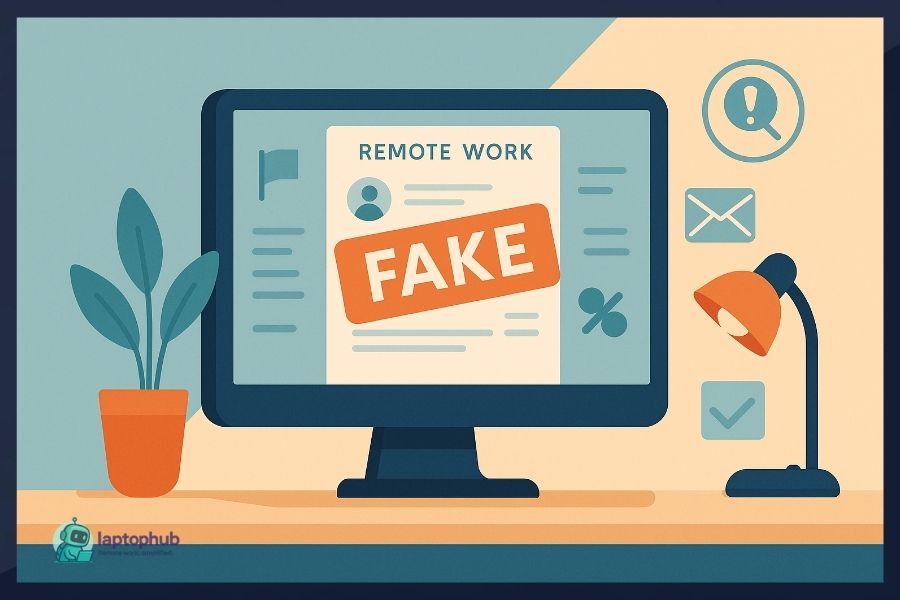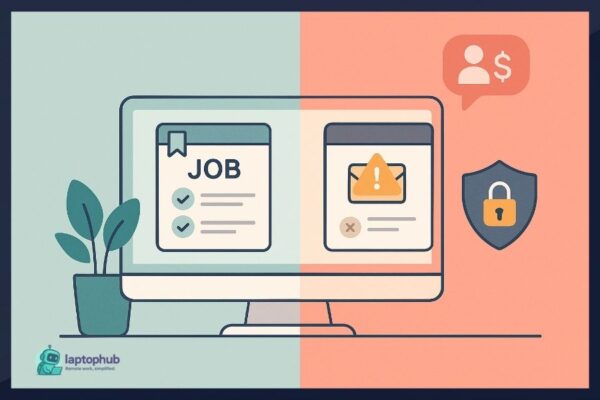The job search is stressful enough without having to wonder if that perfect remote gig is even real. Between flashy pay, vague descriptions, and shady recruiters sliding into your DMs, spotting a fake job posting has become a skill every student and remote worker needs to master. With scams becoming more polished by the day, knowing how to protect your time, your data, and your future career isn’t just smart—it’s necessary.
💡Key takeaways:
- Fake job postings often appear too good to be true, offering high pay with little to no effort or experience required.
- Scammers target remote workers and students by exploiting urgency, vague descriptions, and nontraditional communication methods.
- Red flags include no company presence, unverified recruiters, requests for money or personal info, and skipping proper interviews.
- Verifying job offers through research, asking direct questions, and trusting your instincts is key to avoiding scams.
Why fake remote job postings are on the rise?
Remote work has exploded. And so have the scams.
Scammers know that:
- Students and early-career job seekers are actively searching
- Many people are eager to work from home (especially post-2020)
- First-time job seekers may not know what to expect in a real hiring process
That’s why you’ll find fake listings on:
- Job boards like Indeed or Handshake
- Reddit (especially r/forhire or r/workonline)
- Facebook groups
- Discord servers
- Even freelance platforms like Upwork
They know you’re looking for flexibility, fast income, or that first big break. And they exploit that.
Top Signs a Remote Job Posting Is Fake
1. It Sounds Way Too Good
Let’s say you find a listing that says:
“Remote data entry – no experience – $60/hour – flexible hours – start today!”
That’s not a job. That’s bait.
Real companies don’t throw money around for zero effort. If the pay is super high for something simple, or if they say “no experience needed” for a high-paying role, it’s likely a scam.
Watch for:
- Vague tasks (e.g., “just post on social media” or “answer a few emails”)
- Promises of fast money or guaranteed hiring
- Super short descriptions with no details about what you’ll actually be doing
2. The Company Seems… Invisible
Before you apply, take 60 seconds and Google the company.
Ask:
- Do they have a real website?
- Can you find their employees on LinkedIn?
- Are there reviews on Glassdoor or Reddit?
- Is their email domain something sketchy like “@gmail.com” or “@company-jobteam.com”?
If the company is impossible to find or looks slapped together, skip it. Scammers often make up fake companies or copy the names of real ones with small spelling changes.
3. The Interview Is Sketchy (or Doesn’t Happen)
Real employers talk to you before hiring you. Even for remote gigs.
Scammers, on the other hand:
- Use chat-only interviews (on Telegram, WhatsApp, or Messenger)
- Avoid video calls or phone conversations
- Ask generic questions like “Are you a hardworking person?”
- Offer the job immediately after the first message
If they “hire” you after a quick chat without asking about your background, your skills, or even your name—run.
Real talk: If you’re not interviewed like a professional, they don’t plan to treat you like one.
4. They Ask for Money or Sensitive Info
This is the biggest red flag of all.
A legit employer will never ask you to:
- Pay for a background check
- Send money for training or equipment
- Buy gift cards as part of the “application process”
- Share your Social Security number or bank info before a contract is signed
Some scams even send a fake check, ask you to “buy supplies,” and then leave you stuck when the check bounces.
If it feels weird, it is weird.
5. The Job Description Is Super Generic
If the job listing could apply to anyone in the world, that’s a problem.
Bad listing example:
“We’re hiring smart, motivated people to join our fast-growing company. Work from home! Flexible hours!”
Okay… doing what?
What a real job post includes:
- What the company does
- What your day-to-day looks like
- What skills they’re looking for
- How they’ll train or support you remotely
If they can’t explain the job, you can’t do it—and they probably don’t want you to. They want something else.
How Fake Jobs Target Students Specifically
If you’re a student or recent grad, you’re especially at risk. Scammers know:
- You’re new to job hunting
- You might be excited (or desperate) to land something
- You may not have a professional network yet to ask, “Is this legit?”
Here are common student-targeted scams:
- Fake internships that ask you to “pay for certification” before starting
- “Campus ambassador” roles that lead to multi-level marketing schemes
- Fake “research assistant” gigs that want your personal data for “admin setup”
- Free “test projects” that they use without paying you
Be extra cautious if you’re applying to gigs through:
- School Facebook groups
- Reddit subs like r/internships or r/collegeresults
- DMs from strangers offering “opportunities”
How Scammers Find You (Even If You Didn’t Apply)
You don’t have to apply to get targeted. If you’ve posted “open to work” anywhere online, you’re visible.
Scammers scrape:
- LinkedIn profiles
- Online resumes
- Reddit posts in job-seeking threads
- Discord servers for remote workers
- College job boards
They’ll message you with things like:
“Saw your profile. You look perfect for our remote position!”
Just because someone sounds nice doesn’t mean it’s real. Always ask for proof before proceeding.
What a Legit Remote Job Should Look Like
Here’s what real remote hiring looks like:
✅ They use company email addresses (not Gmail or ProtonMail)
✅ There’s a website with real people on the team
✅ You go through at least one interview or screening
✅ They give you a contract or written offer
✅ They don’t ask for payment or sensitive info upfront
✅ They explain the role, tasks, and tools you’ll use
And yes, some remote internships and jobs are casual—but even casual work should respect your time and security.
How to Verify a Remote Job or Internship Offer
Here’s a checklist to run through before saying yes:
✅ Google the company name + “scam”
✅ Search LinkedIn for the company and recruiter
✅ Check their email domain (e.g., name@company.com)
✅ Ask: What tools do you use to manage remote teams?
✅ Request a video call or short intro meeting
✅ Never send payment, gift cards, or bank info upfront
✅ Ask for a contract or offer letter in writing
Still unsure? Screenshot the job post and ask in a trusted community (like a Discord server or Reddit thread). People are often quick to call out scams.
What to Do If You Think You’ve Been Scammed
First off—don’t panic. And don’t feel dumb. These scams are designed to trick smart, capable people.
Here’s what to do:
- Stop all communication with the scammer
- If you sent money, contact your bank immediately
- Change passwords if you gave out login info
- Scan your device for malware if you downloaded files
- Report the scam:
- To the job platform (LinkedIn, Handshake, etc.)
- To the FTC: reportfraud.ftc.gov
- To your school’s career office (they may warn others)
Real Examples of Fake Jobs People Fell For
These aren’t hypotheticals. These actually happened:
Student received an offer for a paid remote internship after a short chat. They were asked to send $75 for “remote work tools.” Company disappeared after payment.
Freelancer accepted a “remote content writing gig” from a crypto startup. After submitting two articles as a sample, they stopped responding—then published her work under someone else’s name.
Remote customer service role offered after a WhatsApp interview. The “HR rep” asked for banking info to set up direct deposit. Identity theft followed.
How to spot a fake job posting FAQs
Unrealistic pay, vague descriptions, sketchy email domains, and requests for money or personal info are all major red flags.
Look up the company’s website, check LinkedIn for employees, and see if the job post appears elsewhere under different names.
Not all, but scammers heavily target remote roles because communication is expected to be digital and less formal.
Yes—many scammers find you through public profiles or job seeker posts and send unsolicited offers that seem legit.
Stop communication, notify your bank, freeze your credit if needed, and report the incident to the FTC or relevant authorities.
Final thoughts: protect your time, data, and future
If you’re working remotely, job hunting as a student, or trying to break into online work—scammers are betting you’re too busy or too trusting to notice red flags.
Prove them wrong.
✅ Do your research
✅ Trust your gut
✅ Talk to real people before committing
✅ Ask questions and expect real answers
You deserve a job that values your time and talent. Don’t settle for a sketchy shortcut that could cost you way more than a missed opportunity.





